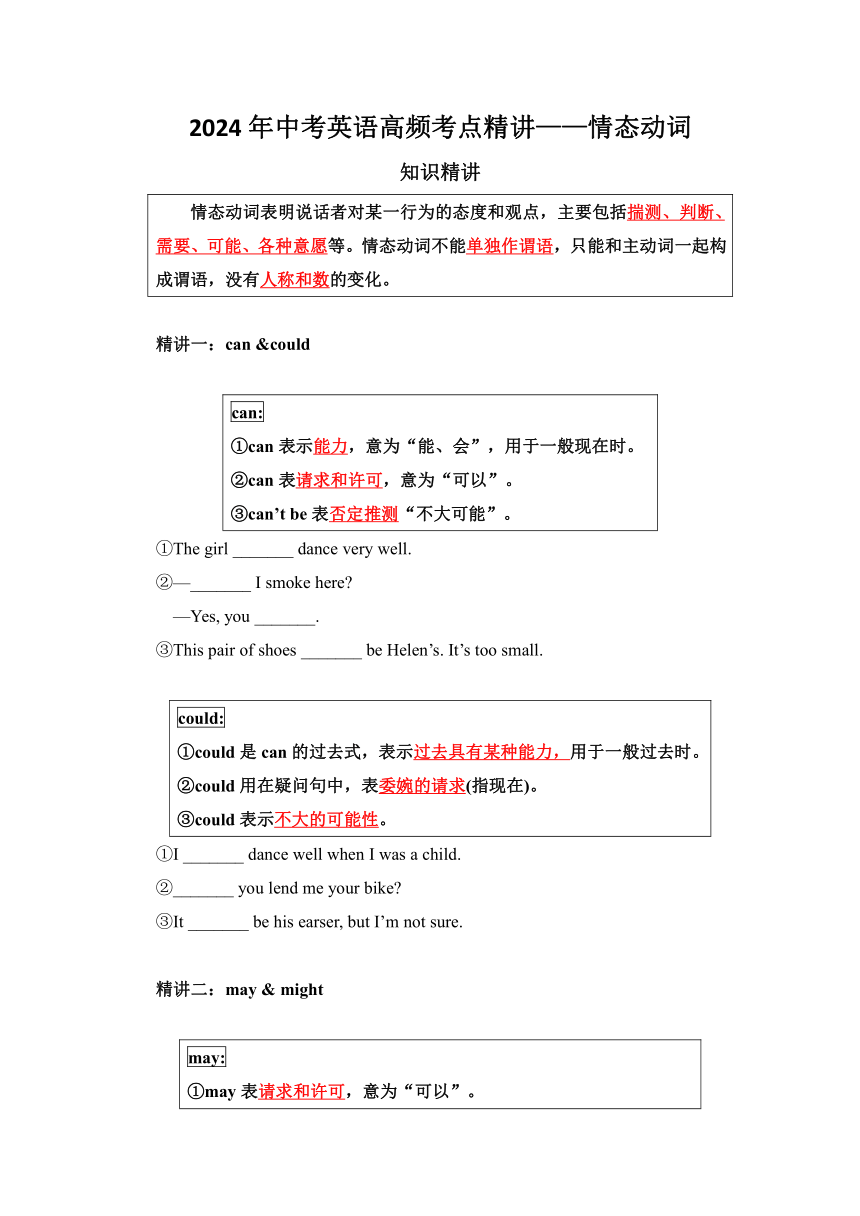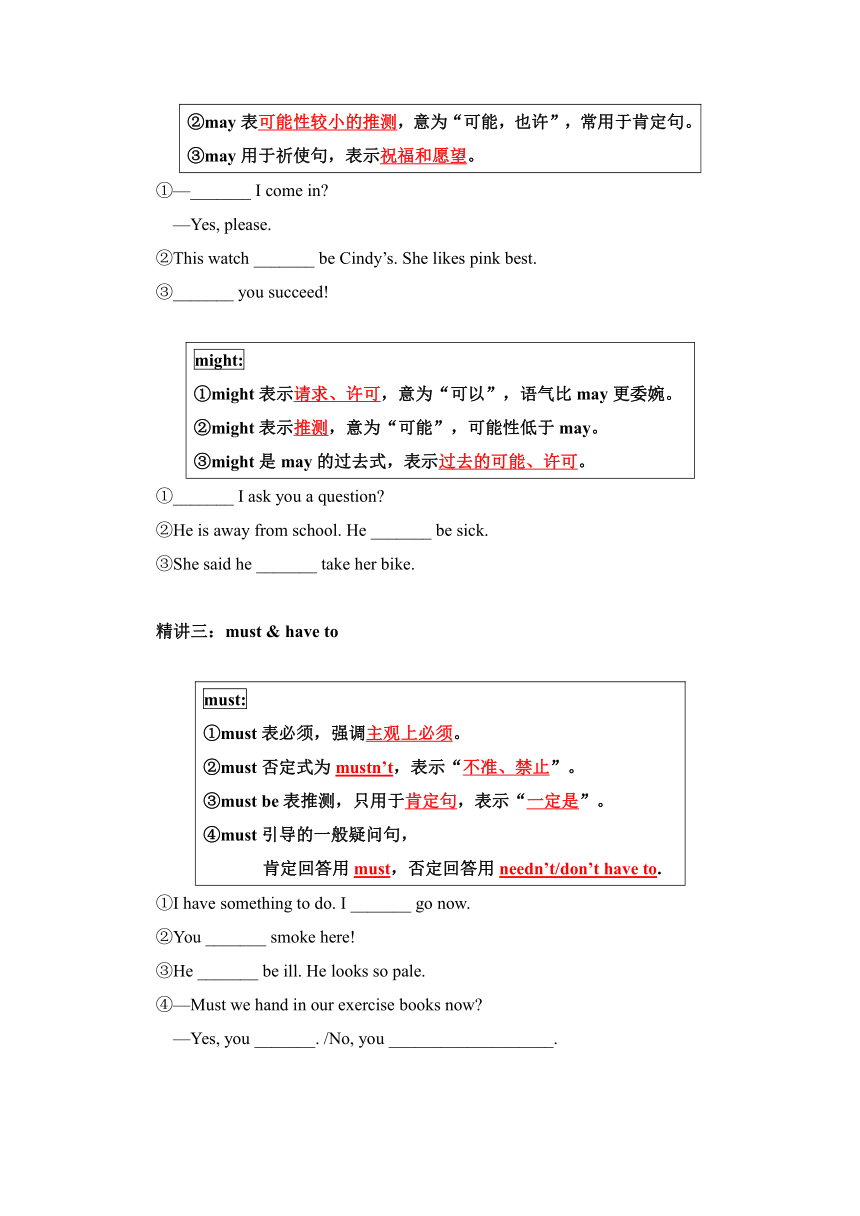2024年中考英语高频考点精讲—情态动词(无答案)
文档属性
| 名称 | 2024年中考英语高频考点精讲—情态动词(无答案) |  | |
| 格式 | docx | ||
| 文件大小 | 24.5KB | ||
| 资源类型 | 教案 | ||
| 版本资源 | 通用版 | ||
| 科目 | 英语 | ||
| 更新时间 | 2024-03-05 20:13:53 | ||
图片预览


文档简介
2024年中考英语高频考点精讲——情态动词
知识精讲
情态动词表明说话者对某一行为的态度和观点,主要包括揣测、判断、需要、可能、各种意愿等。情态动词不能单独作谓语,只能和主动词一起构成谓语,没有人称和数的变化。
精讲一:can &could
can: ①can表示能力,意为“能、会”,用于一般现在时。 ②can表请求和许可,意为“可以”。 ③can’t be表否定推测“不大可能”。
①The girl _______ dance very well.
②—_______ I smoke here
—Yes, you _______.
③This pair of shoes _______ be Helen’s. It’s too small.
could: ①could是can的过去式,表示过去具有某种能力,用于一般过去时。 ②could用在疑问句中,表委婉的请求(指现在)。 ③could表示不大的可能性。
①I _______ dance well when I was a child.
②_______ you lend me your bike
③It _______ be his earser, but I’m not sure.
精讲二:may & might
may: ①may表请求和许可,意为“可以”。 ②may表可能性较小的推测,意为“可能,也许”,常用于肯定句。 ③may用于祈使句,表示祝福和愿望。
①—_______ I come in
—Yes, please.
②This watch _______ be Cindy’s. She likes pink best.
③_______ you succeed!
might: ①might表示请求、许可,意为“可以”,语气比may更委婉。 ②might表示推测,意为“可能”,可能性低于may。 ③might是may的过去式,表示过去的可能、许可。
①_______ I ask you a question
②He is away from school. He _______ be sick.
③She said he _______ take her bike.
精讲三:must & have to
must: ①must表必须,强调主观上必须。 ②must否定式为mustn’t,表示“不准、禁止”。 ③must be表推测,只用于肯定句,表示“一定是”。 ④must引导的一般疑问句, 肯定回答用must,否定回答用needn’t/don’t have to.
①I have something to do. I _______ go now.
②You _______ smoke here!
③He _______ be ill. He looks so pale.
④—Must we hand in our exercise books now
—Yes, you _______. /No, you ___________________.
have to: have to意为“不得不”,强调客观上必须,有各种人称、时态和数的变化。don’t have to (不必) = needn’t
—It’s raining heavily. He _______ take a taxi to school.
—Good idea! He ________________ walk to school.
即时训练
用can, could, may, might, must和have to的适当形式填空。
1. Everyone here ________ speak English.
2. I ________ play the piano five years ago.
3. —________ I go with them
—Yes, you ________.
4. The children ________ get up early to catch the first bus.
5. __________ I watch TV for a while, Mum
6. It _____ be father. He went to Beijing this morning.
7. All passengers ________ go through safety check before they take a plane.
8. Please don’t make so much noise. I ________ hear the speaker very well.
9. Ladies and gentlemen, let me, if I ________, introduce you my manager, Bill Wealth.
10. They ________ play football last Friday because Simon forgot to bring his football here.
后测
( ) 1. —I’d like to meet some Americans to learn more about western culture.
— You ________ go to the English corner.
A. must B. have to C. would D. could
( ) 2. —Mom, ________ you help me make some tradition food tomorrow
—No problem, my dear.
A. must B. need C. can D. May
( ) 3. —I’m going to the bookstore tomorrow morning. Will you come along
—I’m not sure. I ________ have to play with my sister.
A. must B. will C. can D. might
( ) 4. —Where is Susan
—She ________ go to the teachers’ office, but I’m not sure.
A. might B. must C. need D. can
( ) 5. —________ you please make your bed
—OK, but I want to watch a show first.
A. Should B. Must C. Could D. May
( ) 6. —Must I finish reading the book today
—No, you ________ if you have something else to do.
A. mustn’t B. couldn’t C. can’t D. don’t have to
( ) 7. A teacher ________ also make a mistake if he or she is not careful enough.
A. must B. can C. may D. shall
( ) 8. According to the new traffic law, everyone in a car ________ wear the seat belt.
A. can B. may C. must D. will
( ) 9. —Can your sister ________volleyball
—Yes, she can. But she ________ play it very well.
A. playing; can’t B. playing; can
C. play; can’t D. play; can
( ) 10. Johnny, you ________ finish your homework now. You can do it tomorrow morning.
A. can’t B. shouldn’t C. mustn’t D. don’t have to
知识精讲
情态动词表明说话者对某一行为的态度和观点,主要包括揣测、判断、需要、可能、各种意愿等。情态动词不能单独作谓语,只能和主动词一起构成谓语,没有人称和数的变化。
精讲一:can &could
can: ①can表示能力,意为“能、会”,用于一般现在时。 ②can表请求和许可,意为“可以”。 ③can’t be表否定推测“不大可能”。
①The girl _______ dance very well.
②—_______ I smoke here
—Yes, you _______.
③This pair of shoes _______ be Helen’s. It’s too small.
could: ①could是can的过去式,表示过去具有某种能力,用于一般过去时。 ②could用在疑问句中,表委婉的请求(指现在)。 ③could表示不大的可能性。
①I _______ dance well when I was a child.
②_______ you lend me your bike
③It _______ be his earser, but I’m not sure.
精讲二:may & might
may: ①may表请求和许可,意为“可以”。 ②may表可能性较小的推测,意为“可能,也许”,常用于肯定句。 ③may用于祈使句,表示祝福和愿望。
①—_______ I come in
—Yes, please.
②This watch _______ be Cindy’s. She likes pink best.
③_______ you succeed!
might: ①might表示请求、许可,意为“可以”,语气比may更委婉。 ②might表示推测,意为“可能”,可能性低于may。 ③might是may的过去式,表示过去的可能、许可。
①_______ I ask you a question
②He is away from school. He _______ be sick.
③She said he _______ take her bike.
精讲三:must & have to
must: ①must表必须,强调主观上必须。 ②must否定式为mustn’t,表示“不准、禁止”。 ③must be表推测,只用于肯定句,表示“一定是”。 ④must引导的一般疑问句, 肯定回答用must,否定回答用needn’t/don’t have to.
①I have something to do. I _______ go now.
②You _______ smoke here!
③He _______ be ill. He looks so pale.
④—Must we hand in our exercise books now
—Yes, you _______. /No, you ___________________.
have to: have to意为“不得不”,强调客观上必须,有各种人称、时态和数的变化。don’t have to (不必) = needn’t
—It’s raining heavily. He _______ take a taxi to school.
—Good idea! He ________________ walk to school.
即时训练
用can, could, may, might, must和have to的适当形式填空。
1. Everyone here ________ speak English.
2. I ________ play the piano five years ago.
3. —________ I go with them
—Yes, you ________.
4. The children ________ get up early to catch the first bus.
5. __________ I watch TV for a while, Mum
6. It _____ be father. He went to Beijing this morning.
7. All passengers ________ go through safety check before they take a plane.
8. Please don’t make so much noise. I ________ hear the speaker very well.
9. Ladies and gentlemen, let me, if I ________, introduce you my manager, Bill Wealth.
10. They ________ play football last Friday because Simon forgot to bring his football here.
后测
( ) 1. —I’d like to meet some Americans to learn more about western culture.
— You ________ go to the English corner.
A. must B. have to C. would D. could
( ) 2. —Mom, ________ you help me make some tradition food tomorrow
—No problem, my dear.
A. must B. need C. can D. May
( ) 3. —I’m going to the bookstore tomorrow morning. Will you come along
—I’m not sure. I ________ have to play with my sister.
A. must B. will C. can D. might
( ) 4. —Where is Susan
—She ________ go to the teachers’ office, but I’m not sure.
A. might B. must C. need D. can
( ) 5. —________ you please make your bed
—OK, but I want to watch a show first.
A. Should B. Must C. Could D. May
( ) 6. —Must I finish reading the book today
—No, you ________ if you have something else to do.
A. mustn’t B. couldn’t C. can’t D. don’t have to
( ) 7. A teacher ________ also make a mistake if he or she is not careful enough.
A. must B. can C. may D. shall
( ) 8. According to the new traffic law, everyone in a car ________ wear the seat belt.
A. can B. may C. must D. will
( ) 9. —Can your sister ________volleyball
—Yes, she can. But she ________ play it very well.
A. playing; can’t B. playing; can
C. play; can’t D. play; can
( ) 10. Johnny, you ________ finish your homework now. You can do it tomorrow morning.
A. can’t B. shouldn’t C. mustn’t D. don’t have to
同课章节目录
- 词法
- 名词
- 动词和动词短语
- 动词语态
- 动词时态
- 助动词和情态动词
- 非谓语动词
- 冠词
- 代词
- 数词和量词
- 形容词副词及其比较等级
- 介词和介词短语
- 连词和感叹词
- 构词法
- 相似、相近词比较
- 句法
- 陈述句
- 一般疑问句和否定疑问句
- 特殊疑问句及选择疑问句
- 反意疑问句
- 存在句(There be句型)
- 宾语从句
- 定语从句
- 状语从句
- 主谓一致问题
- 简单句
- 并列句
- 复合句
- 主谓一致
- 主、表语从句
- 名词性从句
- 直接引语和间接引语
- 虚拟语气
- 感叹句
- 强调句
- 倒装句
- 祈使句
- 句子的成分
- 句子的分类
- 题型专区
- 单项选择部分
- 易错题
- 完形填空
- 阅读理解
- 词汇练习
- 听说训练
- 句型转换
- 补全对话
- 短文改错
- 翻译
- 书面表达
- 任务型阅读
- 语法填空
- 其他资料
